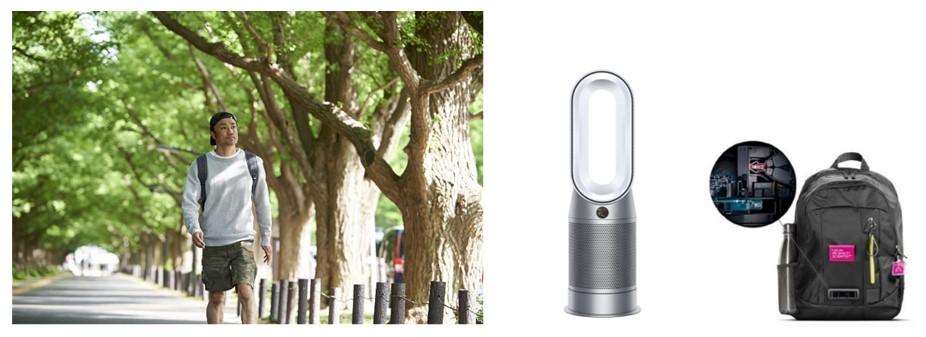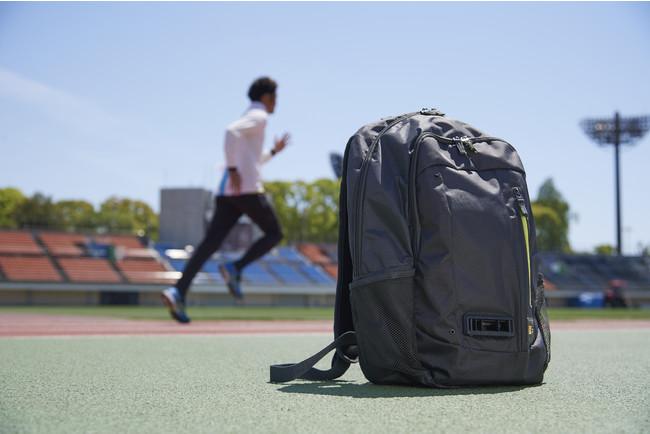
Athletes from 6 countries around the world collaborate to investigate daily air quality using Dyson's built-in air quality sensor backpack
This backpack is a portable air quality measuring device that can collect air quality data while on the move, leveraging the sensor technology used in Dyson's air purifiers. It has a built-in particle sensor, gas sensor, battery pack, and GPS, and you can check the air condition around the backpack. Initially, the air quality survey using this backpack started as part of the Breeze London project in London and Kings College London, and was used as a backpack that can measure the air quality for 250 elementary school students in London. I did. From the results of the survey, we mapped the air pollution status of the school road, changed the school route and the method of school to a route with less air pollution, and helped to keep the polluted air away from children. Dyson now wants to use this backpack around the world to raise awareness of the air around us and help reduce the amount of dirty air around us. Alex Knox, Vice President of Air Conditioning Appliances at Dyson, said: “Through this backpack project with athletes, we are further expanding our research on air quality. By providing athletes with air quality data, we will be able to manage the quality of the air around us. Through this initiative, we are also focusing on raising people's awareness of air quality in their daily lives. We would like to further expand this awareness by working with athletes who are extremely conscious of their physical and health. I am. "
Shingo Suetsugu (Japan), Nettie Edmondson (Australia), Dafne Schippers (Netherlands), Mujinga Kambundji (Switzerland), Thomas Röhler (Germany), Anastasia Pavlyuchenkova (Germany) 6 people from (Russia) participated. We used this backpack in our daily lives, such as traveling to the gym for training, walking with pets, and eating with friends, and collected data to track the condition of the dirty air around us. Survey outline in Japan Survey name: Dyson Air quality survey Survey target: Tokyo / Kanagawa area Survey period: April 2021 Survey method: Using a prototype backpack with built-in sensor technology installed in Dyson air purifiers Conducted an air quality survey. Dyson engineers analyzed the air quality data for the duration of use by comparing the athlete's behavior records with the air quality data detected from the backpack and the GPS data. We also analyzed indoor and outdoor air quality by combining it with indoor air quality data from Dyson's air purifiers at athletes' homes. These studies helped athletes understand what can cause air pollution and how to avoid polluted air in their daily lives in the future.・ From the data of athletes training at gyms and other training centers, we detected an increase in human movement and an increase in PM 2.5 and VOC from suspended particles such as dust. • Harmful gases such as PM 2.5 and NO2 (nitrogen dioxide) were detected as athletes drove towards the city center. These can generally be pollutants associated with tire wear from car exhaust and brakes. -When cooking in the kitchen, pollutants such as PM2.5 were detected. Combustion during cooking may release particulate matter into the air. The results of a detailed air survey are available in Newsroom <
This press release contains information for the media.
If you register as a media user, you can view various special information such as contact information of the person in charge of the company and information on events and press conferences. * Contents vary depending on the press release.
- Press Release>
- Dyson Co., Ltd.>
- Athletes from 6 countries around the world collaborate to investigate daily air quality using Dyson's built-in air quality sensor backpack
- kinds
- Survey report
- Business category
- Cooking / household appliances Health / beauty appliances
- keyword
- Related URL
- https://www.dyson.co.jp/community/news.aspx

